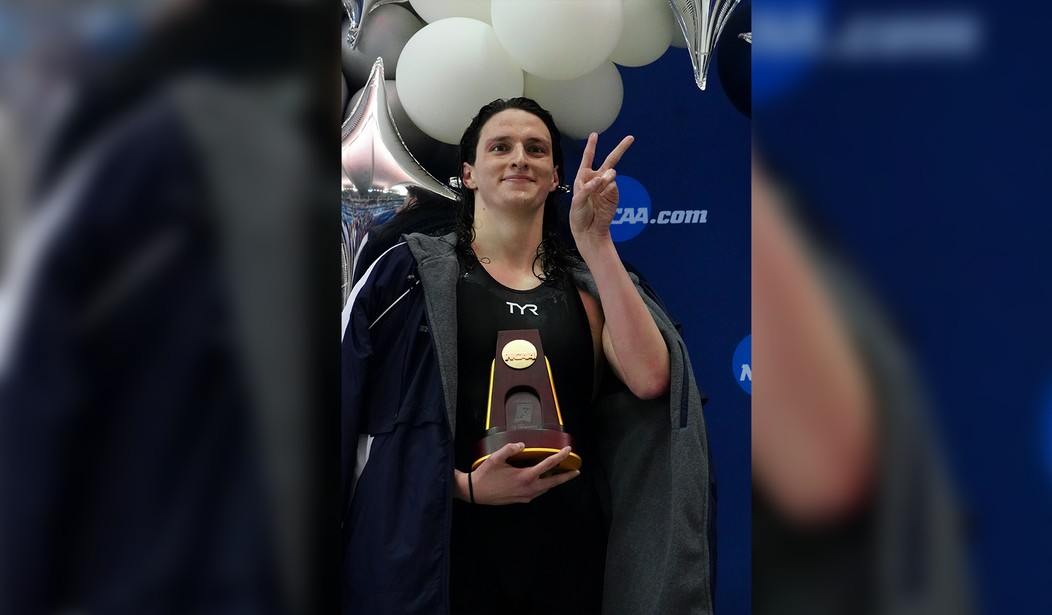International sport, one would think, should be an endeavor based on fairness above all. That's the central tenet of sportsmanship, isn't it? Making sure that all such competitions are fair, based on easily understood rules based on consistent principles, and measuring all competitors by the same standard?
Shouldn't that include making sure men and women are judged by differing standards, based on the biological facts that men are, by a considerable margin, typically larger, stronger, faster, with more endurance than women?
You would think so, but these days, that sure doesn't always seem to be the case.
Once in a while, there is a bit of good news, although in this case, it's a bit mixed. On Wednesday, the Swiss-based Court of Arbitration for Sport (CAS) rejected an appeal from American swimmer Lia Thomas, who sought to force himself even more into women's swimming.
The Court of Arbitration for Sport (CAS) has dismissed a challenge from transgender swimmer Lia Thomas, who had asked the Swiss-based court to reject a policy that would prevent her from competing in women's races at elite competitions.
In its ruling, which was obtained by USA TODAY Sports on Wednesday, the panel of arbitrators essentially determined that Thomas did not have standing to appeal the policy created by swimming's international federation, World Aquatics, because that policy does not yet apply to her. The CAS panel found that "for the time being" she is not eligible to compete in elite competitions through World Aquatics or USA Swimming.
"She is currently only entitled to compete in USA Swimming events that do not qualify as 'Elite Events,'" according to the arbitral award.
Well, that's something of a mixed blessing, but it's a step towards acknowledging reality. Why mixed? Because the ruling was issued not on fairness for women swimmers, although it does have that effect, but because Thomas lacks standing since he is not entitled to compete in the relevant events. The CAS is also leaving themselves some wiggle room by using the term "for the time being," which is a trifle pusillanimous.
That hasn't stopped Thomas from taking other events and titles away from young women in American NCAA events.
Thomas, the first openly transgender athlete to win an NCAA championship at the Division I level, had argued that World Aquatics' gender inclusion policy − which effectively banned transgender competitors from competing in men's or women's races at elite competitions, such as the Olympic Games or world championships − is discriminatory.
There is nothing discriminatory about these rules. They are ensuring that women compete with women, and men with men.
See Related: WV Middle-School Girls Protest, Refuse to Compete With Transgender Athlete
That is the very definition of fair.
We've been over this before, but it bears repeating. Humans are mammals; therefore, we have sexual bipolarity like all other mammal species; there are two sexes, male and female, men and women. We also exhibit sexual dimorphism in that men are, on average, larger, stronger, faster, with more endurance, and more tolerant of trauma than women.
These are facts.
It is unfair, in any sport where success is based on speed, strength, or endurance, like swimming, for men to compete against women.
These are facts.
A man pretending to be a woman, as Thomas is doing, is seeking an unfair advantage; to put a point on it, cheating. There will be no fairness in women's sports until this kind of thing is stopped.
As far as the issue of men invading women's spaces, such as restrooms, locker rooms, and dressing rooms, I will let another swimmer and actual woman, Riley Gaines, speak to that, as her perspective is far more personal.
Riley Gaines' experience has been largely ignored by the American sports media, but as long as she keeps speaking, she will gain listeners, and we can hope, in time, her advocacy will help return some sanity to women's sports.














Join the conversation as a VIP Member